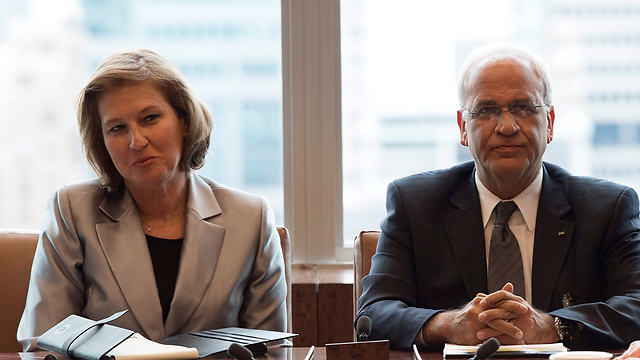
Livni and Erakat at the start of the peace negotiations in 2013 (Photo EPA)
A senior Israeli official said Prime Minister Benjamin Netanyahu and Defense Minister Moshe Ya'alon had on Wednesday instructed Maj. Gen. Yoav Mordechai, coordinator of government activities in the territories, to prepare a list of possible punitive measures against the Palestinians in the West Bank. One of the proposals accepted was the suspension of an Israeli permit allowing the Palestinian wireless provider Wataniya, which operates in the West Bank, to bring equipment into the Gaza Strip for the company's planned mobile communications infrastructure there.
In the meantime the Palestinian negotiators from their side have posed seven conditions that must be met by Israel to continue negotiations beyond April 29. The conditions were announced during a 9-hour meeting Wednesday with Israeli negotiators in Jerusalem, a high-ranking source in the PLO told the Palestinian press agency Ma’an News. According to the source, the conditions are the following:.
1. To receive a written letter from Israel's premier recognizing the Palestinian borders of 1967 with East Jerusalem as its capital.
2. The release of Palestinian prisoners who former Prime Minister Ehud Olmert agreed to free including Marwan Barghouthi, Ahmad Saadat, and Fuad Shweiki.
3. Implementing a border-crossing agreement and lifting the siege on Gaza.
4. The return of exiles deported in the 2002 Bethlehem siege.
5. Stopping settlement activity in Jerusalem, and opening closed institutions in Jerusalem.
6. Allowing the reunification of 15,000 Palestinians with their families.
7. Israel refraining from entering areas under Palestinian Authority control for arrests or killings, and granting the PA some control over Area C.
In a meeting with Fatah officials, chief PLO negotiator Saeb Erekat and central committee member Mahmoud al-Aloul said that submitting applications to join 15 international organizations was a small step taken by the Palestinians to regain their rights. The PLO was all in all considering to apply for membership in 63 organisations, Erakat said.
Erakat, according to a separate news item from Ma'an recommended to urgently reconvene the Palestinian Nationa Council, the PLO-parliament, in order to elect a new Executive Council (the PLO-Executive) wuith the participation of Hamas and the Islamic Jihad.
The Israeli-Palestinian-American meeting began at around 7:30 P.M. Wednesday and ended some nine hours later, at 4 A.M. Thursday. The Israeli representatives were Livni and Netanyahu's envoy for the peace process Isaac Molho. The Palestinians were presented by chief negotiator Saeb Erekat and intelligence chief Majid Faraj. The Americsanm envoy Martin Indyk convened the meeting in an effort to save the peace process, but it quickly turned into a stage for mutual recriminations and threats. A senior Palestinian official described the meeting as a "tough political battle." Indyk did his best to ease the tensions, but in the end the meeting ended in failure.

.jpg)
.jpg)


No comments:
Post a Comment